 Amphibious armored vehicle unit conducts open sea drill
Amphibious armored vehicle unit conducts open sea drill
 Water relay in Henan
Water relay in Henan
 Ethnic culture feasts eyes of travelers
Ethnic culture feasts eyes of travelers
 80 security dogs assembled in Nanjing police dog training base
80 security dogs assembled in Nanjing police dog training base
 Graffiti artists paint on street walls in Xinjiang
Graffiti artists paint on street walls in Xinjiang
 Story of ceramic artist Zhang Lingyun
Story of ceramic artist Zhang Lingyun
 Magic summer night dream in Hongyuan
Magic summer night dream in Hongyuan
 Incredible creatures in headwaters drainage region of Lancang River
Incredible creatures in headwaters drainage region of Lancang River
 The future of rock n' roll seen in young rockers in China
The future of rock n' roll seen in young rockers in China
 Magnificent Yanziya Cliff
Magnificent Yanziya Cliff
BEIJING, Aug. 16 -- China's State Archives Administration (SAA) on Saturday published the last of 45 confessions by convicted Japanese war criminals it planned to release in response to Japanese right wing politicians who have denied the country's WWII aggression in China.
According to the handwritten confession by Shoji Nishinaga (alias Ryosuke Nakamura), available on the SAA website, dozens of Chinese patriots were killed by Nishinaga and his subordinates from 1933 to 1940.
From 1933 to 1935, Nishinaga, who served as chief of the Japanese Yanjijian Island Dispatch Military Police and unit commander of the Kaifeng Japanese Military Police, led his subordinates to kill 36 Communist guerrillas and others in the Yanji River region.
In early summer of 1939, he instructed his subordinates to "deliver severe punishment (killing) to the six arrested Communist guerrillas and Kuomintang intelligence operators" in Tongzhou in Beijing, the confession read.
He also ordered military police to kill a total of 12 Chinese patriots when he served in Kaifeng from August 1939 to November 1940, it added.
The latest and last of the 45 Japanese war criminal confessions came one day after China marked the 69th anniversary of Japan's unconditional surrender in World War II.
China's war against Japanese aggression broke out in 1937 and ended on Aug. 15, 1945 with Japan's unconditional surrender, which also cemented victory in WWII. More than 35 million Chinese people were killed or wounded during the conflict.
There were 1,109 Japanese war criminals in custody in China between 1950 and 1956. Among them, 1,017 with minor offenses were exempted from prosecution and released in 1956 and 45 received military trials under the Supreme People's Court that year.
The 45 were charged with planning and implementing an aggression policy, making germ weapons, releasing poisonous gas, conducting experiments on living humans, killing, stealing property, forcible recruitment of "comfort women," rape, and driving people from their homes. They were sentenced to imprisonment of between eight and 20 years.
The SAA began publishing their confessions - one each day - on July 3, following denials of war crimes by Japanese Prime Minister Shinzo Abe and right-wing politicians.
SAA deputy director Li Minghua told Chinese media last month that the 45 confessions were "hard evidence of the heinous crimes committed by Japanese imperialism against the Chinese."
In a 105-page confession signed by Fujita Shigeru, colonel and commander of the 28th Cavalry Regiment and later lieutenant general and commander of the 59th Division of 43rd Army, the Japanese officer detailed the murder of hundreds of Chinese civilians and captives from 1938 to 1945.
"May 21, 1944: shot dead 12 Chinese people (including one woman) in Luoyang, Henan," it read.
"March 27, 1945: massacred all inhabitants of about 50 households in a village along the Dengxian County-Laohekou road, 200 meters to the north of Zhulinqiao, killing seniors, women, children ... and other inhabitants; used gas shells during the attack in Maqushan on the same day."
Another confession by Shuichi Kikuchi told of two brutal vivisections performed on Chinese by Japanese military surgeon Shinji Kawagen in 1941, which Kikuchi witnessed.
"First, [Kawagen] cut the throat apart to stop the captive from making a sound. After the appendectomy, he shot at the gut of the captive with a handgun. He then sutured the gut and laid the captive in the dispensary to see the result," Kikuchi wrote.
On the third day after the first operation, Kawagen performed separation surgery on the joints of the captive and shot him in the head while he was still alive, according to Kikuchi. He confessed that Kawagen performed a similar surgery on a 16-year-old villager days later.
In another interview on Saturday, Li Minghua said all of the 45 admitted their crimes in full in the 1956 trials, adding that the humane treatment they received when serving their time in China and the visits to Chinese cities savaged by war eventually "instilled humanity back to the war criminals."
"And some of them became true promoters and protectors of Sino-Japanese friendship after they were released from China and returned to their home country," said Zhang Jicheng, a curator of a prison museum where some of the Japanese war criminals were held.
He noted that Fujita Shigeru later became the director of Chikenru, an association formed by about 1,100 repatriated Japanese WWII soldiers, and he visited China a number of times to help create friendship between Japanese and Chinese people before he died in 1982.
The SAA on Friday also began releasing documents and videos showing Japan's aggression and defeat to China during the 1930s and 1940s.
A 24-part video series, titled "The Great Victory," will be released on the SAA website, one episode per day.
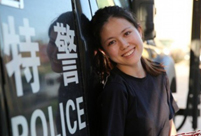 Beautiful policewoman in an anti-terrorism SWAT team
Beautiful policewoman in an anti-terrorism SWAT team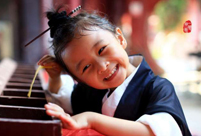 Cute photos of little Taoist nuns and monks go viral online
Cute photos of little Taoist nuns and monks go viral online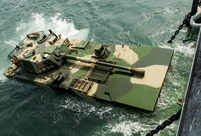 Amphibious armored vehicle unit conducts open sea drill
Amphibious armored vehicle unit conducts open sea drill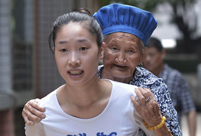 A post-90s girl who takes grandma to work
A post-90s girl who takes grandma to work Beijing policewomen posters become a hit
Beijing policewomen posters become a hit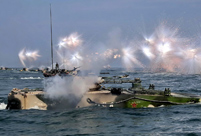 Armored regiment trains on the sea
Armored regiment trains on the sea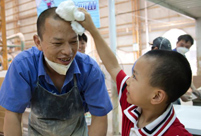 Children spend 'Father's Day' with dads at work
Children spend 'Father's Day' with dads at work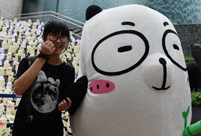 'Pan Da' appear in Shanghai World Financial Center
'Pan Da' appear in Shanghai World Financial Center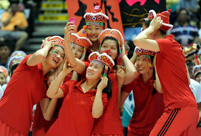 Champions take selfies on podium
Champions take selfies on podium The vanishing folk skills
The vanishing folk skills Intoxicating beauty of Dali, Yunnan province
Intoxicating beauty of Dali, Yunnan province Memorable moments of Ludian earthquake
Memorable moments of Ludian earthquake Bring world together to help elephant
Bring world together to help elephant 'Building Dreams'
'Building Dreams'  Labrang Monastery
Labrang MonasteryDay|Week|Month